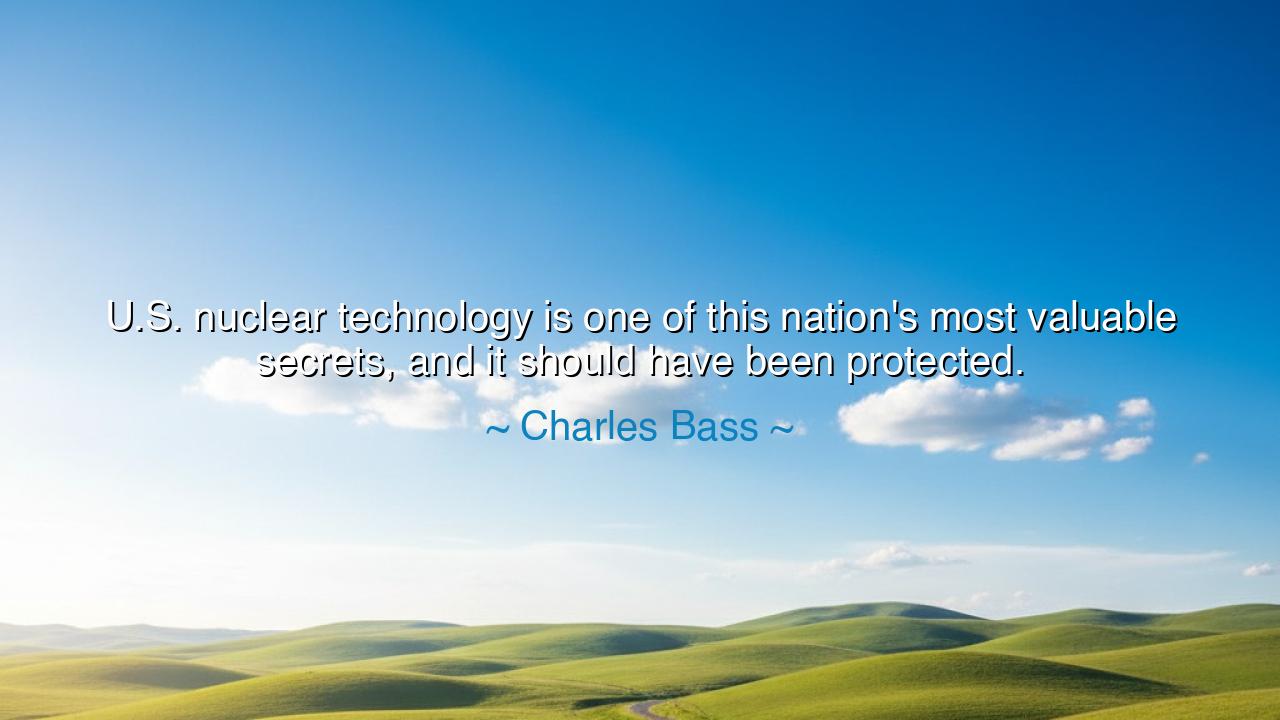
U.S. nuclear technology is one of this nation's most valuable
U.S. nuclear technology is one of this nation's most valuable secrets, and it should have been protected.






The words of Charles Bass, “U.S. nuclear technology is one of this nation's most valuable secrets, and it should have been protected,” ring with the weight of solemn warning and enduring truth. He speaks not only of machines and materials, but of knowledge and power, the kind that can shape civilizations or annihilate them. Nuclear technology is a torch of Promethean fire: it illuminates the path of progress, energy, and defense, yet in the wrong hands, it casts a shadow of destruction across the world. Bass reminds us that such power is not to be taken lightly; secrecy and protection are obligations, as vital as the innovation itself.
The origin of this reflection lies in Bass’s experience as a legislator concerned with national security, particularly in matters of nuclear proliferation. Witnessing the leakage or compromise of sensitive information, he understood that knowledge, once unguarded, becomes a tool not only of creation but of potential devastation. His words carry both critique and counsel: safeguarding technological secrets is an enduring responsibility, one that ensures that innovation serves the people rather than imperiling them.
History offers stark illustration of this principle. During the Manhattan Project in World War II, the United States marshaled unparalleled resources and intelligence to develop the first nuclear weapons. The project’s secrecy was paramount, for the dissemination of knowledge could have altered the course of the war and imperiled humanity. Figures like J. Robert Oppenheimer and Leslie Groves understood that the power of the atom was inseparable from the discipline of protection. Bass echoes this lesson: the value of technology is inseparable from the vigilance exercised over it.
Even more recently, the cases of espionage involving nuclear secrets—such as the Aldrich Ames and Robert Hanssen incidents—illustrate the consequences of lapses in protection. When knowledge designed for national defense fell into adversarial hands, the balance of power shifted, and the risks multiplied. Bass’s words remind us that nuclear technology is not merely an asset; it is a covenant. Its guardianship is as critical as its creation.
The meaning of Bass’s statement is profound: powerful technology demands ethical stewardship and rigorous protection. It is a reminder that knowledge is not neutral. The atom, the fuel, the reactors, and the weapons are inert without human direction—but they amplify intent in ways unimaginable. Secrecy, prudence, and accountability are the shields that transform potential peril into safe progress, preserving the lives and security of future generations.
The lesson for humanity is urgent and timeless: innovation without vigilance can become catastrophe. Every generation inherits the fruits of discovery alongside the burden of responsibility. Bass teaches that guardianship is not passive; it requires foresight, discipline, and ethical consideration. The tools that advance civilization can just as swiftly imperil it if entrusted without care.
Practical action emerges clearly. Support policies that safeguard sensitive technological knowledge, advocate for rigorous security protocols, and cultivate a culture of responsibility among those entrusted with powerful information. Educate the public about the stakes involved, ensuring that society understands the consequences of negligence. Encourage transparency where appropriate, but recognize the distinction between openness and recklessness in matters of national security.
Thus, let Charles Bass’s words endure as guidance through the ages: U.S. nuclear technology is among the nation’s most valuable secrets, and it must be protected. May all who wield knowledge remember that power without stewardship is peril, and that the security of the many depends upon the vigilance and integrity of the few. In honoring this principle, humanity safeguards both its innovation and its survival.






AAdministratorAdministrator
Welcome, honored guests. Please leave a comment, we will respond soon